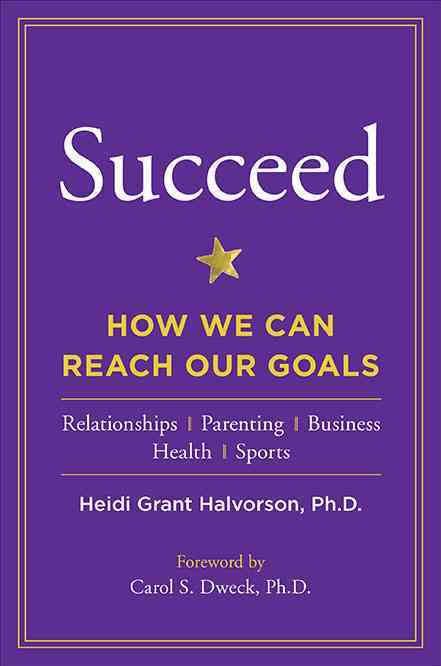第一章
Set specific, difficult goals.
我们要设立明确的,稍有难度但可实现的目标。
当老板跟员工说,家长跟孩子说,老师跟学生说“Do your best”的时候,大多数时候并没有实质性的意义。因为他们并没有告诉别人具体该往哪发力。People pretty much do what is asked of them, and rarely more. Ask for a great performance from someone, and as long as you're specific about what great is, you are much more likely to actually get it.
abstract why & concrete what
这是针对一件事的两种态度,比如,同样是打扫房间,有的人把这件事就是看作扫扫地,擦擦桌子(concrete what),而有的人却是把这件事看成是为了营造一个干净的环境(abstract why)。
When actions are difficult to accomplish, we prefer to think about the "concrete what" rather than the "abstract why".
As we gain more experience doing something and it becomes easier for us, we often start to see it in a more abstract why way---more in terms of its meaning or purpose.
比如,当我们决定要健身时,心中想的是为了有一个健康的身体和完美的身材(abstract why),但当我们开始去做那些陌生且有难度的动作时,我们的精力全都集中在了每一个具体的动作上(concrete why),但一段时间之后这些动作变得很容易之后,我们就会计划着去完成更复杂的动作以便获得更大的提高(abstract why)。
当我们更加关注事情身后的意义而不仅仅是行为本身时,我们将不会那么冲动,那么易受诱惑,它(abstract why)可以给我们更大的动力和自控力。比如,我们刚刚跑完步,很想喝碳酸饮料,但是,一想到我们跑步的目的,往往喝碳酸饮料的念头就打消了。
Q&A(1):(问答环节是为了锻炼自己某项能力,不要展开太多,就题答题)
How to think "why"
1、Write down an action you've had trouble taking recently because you haven't felt motivated or you've given in too much to temptation. It can be anything from not ordering dessert to answering all your important e-mails each day.
朗读英文练习口语。之前跟着“清晨朗读会”读的还可以,但是跟着《American Accent Training》系统学习之后就没动力了,比较繁琐,需要学习发音部位和美语特有的读法,不如直接跟着别人的录音读。后来干脆连跟读都放弃了。
2、Now, write down why you want to take that action. What is the purpose of the action for you? What goal does it help you to achieve? How will you benefit from it?
朗读英语练习口语是为了能做到和别人用英语流畅地交流,更具体来说是为了以后面试的时候能够用英语流畅回答以获得更好的职位。口语流利了,参加类似头马的活动也更有动力。
How to think "what"
1、Write down something you want to accomplish that is really complicated, highly difficult, or new to you. Maybe you want to create your own website but aren't experienced with computers, or perhaps you are thinking about starting a new career.
想学习编程,JavaScript或者是Python。
2、Now, write down what your first step should be. What is the specific action that you need to take in order to begin to accomplish this goal?
第一步就是确定自己想学习哪种语言,然后选一本合适的书和学习网站,能找到哟个一起学习的人或者可以指导自己的人就更好了。
distant future plans & near future plans
distant future plans→why→desirability information→reward
near future plans→what→feasibility information→risk
我们经常会为自己制定很多美好的计划,但多数情况下,当日期临近时,我们却发现我们基本还没做啥工作。为何?因为我们做计划的时候把太多精力放在了这项计划的意义上,而忽视了这项计划的可行性。
另一方面,对于一些近期要发生的有益有趣,可以自我提高的机会,我们却往往会因为手头的各种琐事而放弃。比如,今天下午有一个讲座,自己很感兴趣,起床时还想着要去参加,但是当下午时间快到了,却发现自己还没洗头,还有一堆衣服没有洗,况且坐公交去那就得一小时,然后就开始找借口不去。这时候我们太过于关注了手头上的琐事(what),而忘记了参加这次讲座的意义(why)。
对于未来要做的事情,我们总觉得还有时间,总认为未来的某个星期的7 x 24个小时都可以为我们所用。但我们忘记了 the trade-off between "why" and "what"。如果是下周让你读完一本大部头的书,你还会觉得下周的 7 x 24 小时都可以全为你所用吗?你肯定会开始想其他各种可能占用你时间的事情,甚至会以事情过多不可能读完而拒绝。
Thinking "what" when it comes to your goals is an excellent way to not only be more realistic about your time, but also to prevent procrastination.
对 why thinking 和 what thinking 的总结:
Big-picture, why thinking about your goal is most helpful for getting you motivated and energized, focusing you on the rewards you can gain, and encouraging self-control and persistence. Nitty-gritty, what thinking will benefit you most when your goal involves doing something difficult or unfamiliar, focusing you on the practical details of getting the job done, and helping you to avoid procrastination. Greater achievement comes not from choosing one style over the other, but from deciding how to think about your goal to best overcome the specific challenges you are facing .
The power (and peril) of positive thinking
It's dangerous to believe that you will win, and believe that you will win easily.
The motivational impact of believing you will succeed versus believing you will easily succeed, and has found time and again that these beliefs have very different effects on achievement.
对于计划的自信是必要的,但是不要把它想得过于容易。
People who believe goal pursuit will be difficult plan more, put in more effort, and take more action in pursuit of their goals. They expect to have to work hard, so that’s exactly what they do. In contrast, people who believed that getting a good job after college would be easy sent out fewer applications. Those who imagined themselves falling quickly, hopelessly, and mutually in love with a secret crush were less likely to actually talk to that person about their feelings. Students who thought that doing well on an upcoming exam would be a piece of cake studied for far fewer hours.Ultimately, people who think that reaching their goal will be a breeze simply aren’t prepared for what lies ahead of them, and they can be devastated when the dreams that they’ve enjoyed dreaming about so much don’t actually come true.
简言之就是很多事情我们都只是“想当然”,以为毕了业投投简历就能找到好工作,以为谈了恋爱不用怎么经营就可以恩恩爱爱,以为考试前搞搞突击就可以万事大吉……这些思想害人不浅。
那我们应该如何应对呢?作者在书中提出了 “mental contrasting”—first you imagine attaining your goal, and then you reflect on the obstacles that stand in the way.
Mental contrasting turns wishes and day-dreams into reality, by bringing into focus what you will need to do to make it happen.
Considering both what you want and what stands in your way will give you the clarity to make good decisions—when your chances for success are high, it will increase your commitment to your goal, making you more likely to successfully achieve it. When your chances are not so good, it will help you to recognize that and move on.
第一章总结:
1、Be specific. When you set yourself a goal, try to be as specific as possible.
2、Make it hard. It’s also important when you set goals to make them difficult, while still being realistic
3、Think why or what. Goals can be thought of in relatively abstract, why-am-I-doing-this terms or in more concrete, what-am-I-actually-doing terms.
4、Consider value and feasibility.
5、Think positive but don’t underestimate.
6、Use mental contrasting to set your goals.
第二章
我们对自身优点与缺点的认知影响我们所做的决定。
对于我们的智力的认知,分为两类人,一是我们的智力是可增长的( incremental theorist),另一个是我们的智力天生就是固定的(entity theorist)。
当你是entity theorist的时候,你的基本目标就是向别人以及你自己证明你足够聪明。基于此,entity theorist在做选择或定目标的时候的原则就是避免选择有挑战性的,而是选择更加简单易达成的。
有一个概念叫做“逆努力原则”(inverse effort rule),即一件事情,你做的越费力越说明你并不擅长此事,所以只能靠努力来弥补自身能力的不足。因此,接受了这种认知的人就倾向于选择简单的事情来做。
当你是incremental theorist时,你相信自己的能力可以通过锻炼得到提高,你的注意力也就放在了提高能力上而不是证明自己的能力上。挑战和犯错也不再那么可怕,而变成了提高自己的机会。
锻炼的机会对于我们很重要,一些高学历的父母培养出的孩子普遍情况下也相对聪明,事实上,基因的作用远远要小于后天的培养。这样的父母可以为孩子提供很好的各种学习机会,从小就锻炼各种能力。
我们大多以为做决定是有意识的,目的性很强的。但是绝大多数时候,我们生活中很多目标都是无意识做出来的。某些事情我们平时做的越多,在之后再次做出选择时我们越靠的是我们的无意识决定。比如,你天天坐同一班公交车回家,下班后除了公司大门,你双脚无意识的就把你带到了那个公交车站。而我们这些无意识的决定或选择都是被周围环境中一些特定的线索触发的。比如太阳下山了,保洁阿姨在收拾东西下班,这些都会告诉你下班时间到了。这些和目标有关联的线索一次次出现,当重复的次数够多了后,它们就潜移默化地影响着你的决定。
我们上初中和高中的时候,校园里和班级中张贴着各种激励人的海报和标语,无处不在,我们的感觉大多时候就是我们根本就不回去在意这些标语,甚至会反感。但是,如果突然问你你们班级教室前面的标语是什么,你肯定可以脱口而出。虽然我们自己认为这些口号没有影响我们,但是我们的潜意识却时时刻刻都受着它们的影响。
不要以为我们身边陌生人的存在对于我们没有作用,我们周围陌生人的行为时时刻刻都可以成为我们目标的触发动机。这也就应了那句话,仅仅知道某些人的存在对我们就是很大的激励。
我们经常说近朱者赤,近墨者黑,那么,如果我们经常和一些行为不检点的人在一起,我们是不是生活作风也会出现问题呢?我们的目标是不是会被这些人触发?这个要视情况而定。如果你本身就不认可他们的做法,以为那是错的,那么你的潜意识会帮你作出决定,但如果你内心深处埋藏着不检点的种子,但是之前一直没表现出来,那么,这些朋友的存在就会触发你内心深处的不良动机,朋友的存在甚至会让你更有勇气去这么做。想想看,电视新闻上天天报道抢劫强奸等新闻,我们天天接触这些新闻,我们有几个人去做了,而真正看了去做的,那他内心必定就早已埋藏了这些邪恶的种子。
我们要学会运用我们的“无意识”,比如在墙上贴一张你想去的地方的海报,贴一张你理想大学的图片,把健身的书或杂志放在你眼睛可以看到的地方……不要忽视这些东西的能量。我们的“无意识”行为越多,就可以留给我们更多的心理空间和能量,那么我们就有更多的时间去做那些需要高注意力的事情。同时也可以让我们原理诱惑。现在人工智能的出现,一定程度上就是在解放我们的心理空间,去帮我们做出更多的“无意识”行为,以便腾出精力时间去做其他更复杂的工作。
自证预言发挥着作用,当我们是表现型选手时,遇到困难,我们会怀疑自己的能力,然后就给自己下定论自己做不到,然后自己接下来的行为就真的是按做不到来做的,最后自己就真的没做到。同样,对于进取型的人来说,自证预言帮助他们实现自己的目标,战胜困难。
第二章总结
1、know what is influencing you.
2、Know what you believe about your abilities.
3、Embrace the potential for change.
4、Set up the right environment.
5、Use triggers to tap your unconscious.
第三章 The goals that keep you moving forward
当你的目标是 to be good 时,你会被激励到,但是却倾向于选择易达成的事情而逃避困难的事情,并且更容易感受到压力,这时候就变成了一个“表现型选手”。
当你的目标是 become better,你将更多的精力放在自我提高上。
